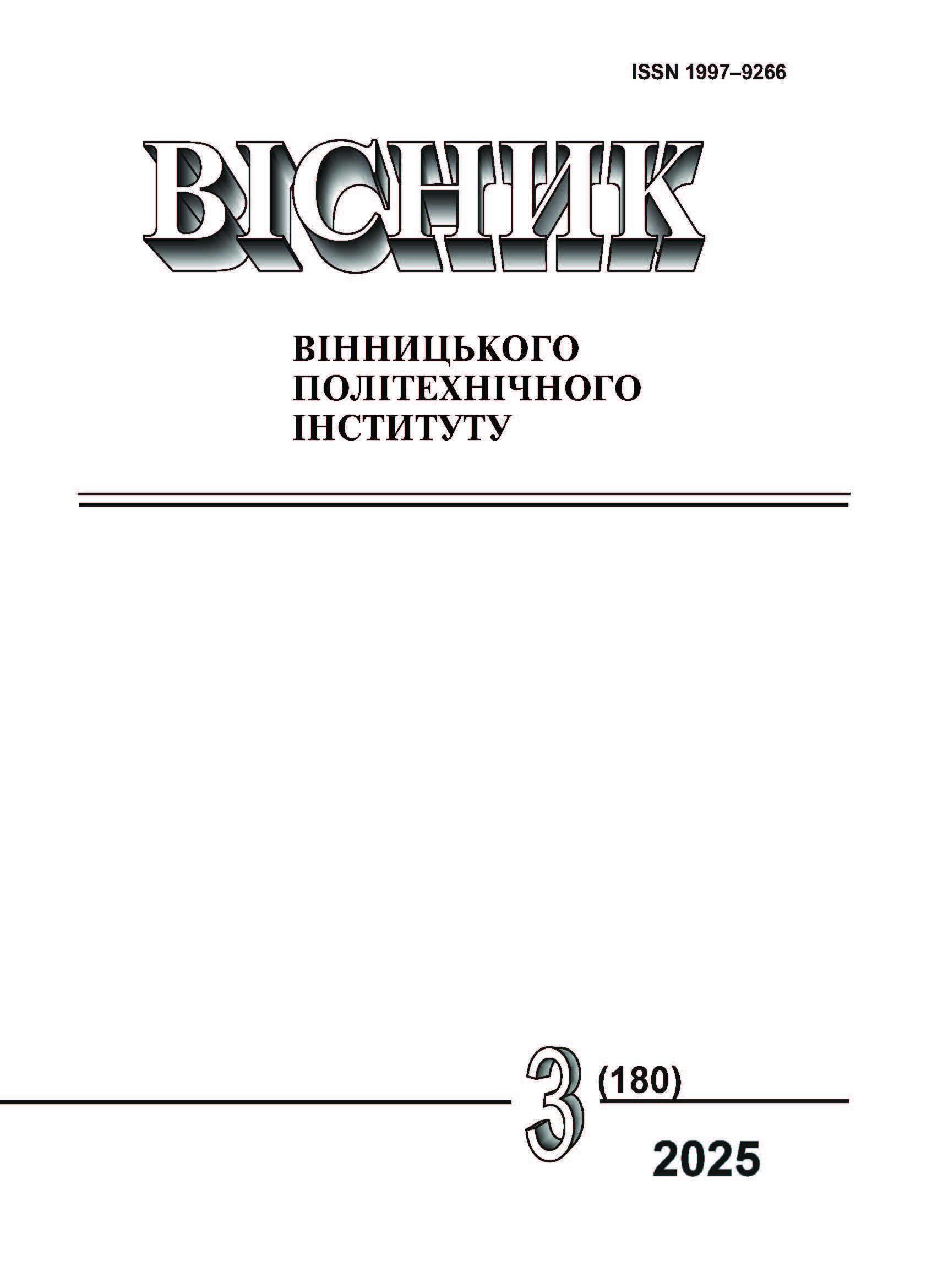Modeling the Process of Controlling the Dynamics of a Longitudinal Cutting Mill
DOI:
https://doi.org/10.31649/1997-9266-2025-180-3-153-160Keywords:
LCM, tension control, transition processAbstract
The paper considers the issues of paper rewinding processes and compliance with technological parameters to ensure the quality of this process. A review of the components of the modern elemental mechanical and electronic base for the design and creation of machines that perform the rewinding processes of various materials and paper in particular is carried out. Attention is paid to the specific features of using the programmable logic controllers and electric drives for the design of rewinding machines.
The kinetics of electrical (voltage and current) and mechanical (rotor angular velocity and shaft torque) of the PRS-501 machine tool were experimentally investigated in the transient technological processes of acceleration and braking when switching from refueling to operating speed
Based on the previously obtained dynamic model, a control system is proposed, developed on the basis of SIEMENS SIMATIC S7-300 and SIEMENS SINAMICS DCM electric drive. High reliability of the correlation of angular velocity from armature voltage (R2 = 0.8588) and shaft torque from consumption current (R2 = 0.8337) in acceleration mode was revealed. In braking mode, respectively, R2 = 0.9117 and R2 = 0.8865.
The mechanical parameters of the strength of the paper being rewound and the dependence between the strength index and the mechanical parameters of the unwinding unit to maintain the tension specified for high-quality rewinding were investigated. Statistical data on the strength index in the longitudinal and transverse directions for one grade of paper were analyzed.
A tension control system for the unwinding motor based on a PID controller was proposed. The mechanical properties of the paper in the longitudinal and transverse directions were studied and show that the basic strength condition σtechn< [σ], and, respectively Mt < [M] is fulfilled in the entire range of their variation. The control system proposes a concept of limiting the operating torque to ensure tension instead of direct torque control to ensure a safe rewinding process in the event of a web break.
References
І. Г. Грабар, О. Є. Жуковський, і Сенн Філіпп, «Моделювання динаміки роторів змінної маси технологічних машин,» Вісник Хмельницького національного університету, серія: Технічні науки, вип. 323 (4/2023), с. 73-81, 2023.
Держстандарт України, ДСТУ 3467-96 «Папір конденсаторний. Загальні технічні умови», 1998
О. М. Мовчанюк, і А. А. Остапенко, Технологія приготування паперової маси. Київ, Україна: КПІ ім. Ігоря Сікорського, 2022.
В. А. Осика, Л. А. Коптюх, В. О. Комаха, і О. С. Шульга, «Формування якості паперу-основи для виготовлення водожиронепроникних пакувальних матеріалів,» Вісник Черкаського державного технологічного університету, № 3/2019.
ISO 1924-2:2008, Paper and board — Determination of tensile properties, 2008.
Jurgen Blechschmidt, und Hans-Joachim Naujock, Taschenbuch der Papiertechnik. Carl Hanser Verlag GmbH & Co. KG, 2021.
Jurgen Blechschmidt, Sabine Heinemann, und Hans-Joachim Naujock, Papier-verarbeitungs-technik. Carl Hanser Verlag GmbH & Co. KG, 2013.
Hans Berger, Automation with STEP7 LAD and FBD Programs, 2nd revised edition, 2001.
SIEMENS AG, List of System Instructions S7-300 CPU 31xC, CPU 31x, IM 151-7 CPU, BM 147-1 CPU, BM 147-2 CPU Edition 12/2003.
SIEMENS AG, SIMATIC NET PROFINET Networks Manual, 2014.
SIEMENS AG, “Standard PIDControl,” User's Guide 03/99,” Release 01.
SIEMENS AG, SIMATIC-Based Control Practical Guide to SIMATIC-Based Control and SIMATIC PCS7 by Jürgen Müller from 2nd edition, 2002.
SIEMENS AG, Motor configuring with SIZER and taking account of the utilization of the deployed third-party motor Retrofit – replacement of a third-party motor FAQ, January 2012.
SIEMENS AG, SINAMICS DCM Parameterization Manual Edition, 02/2015.
SIEMENS AG, SINAMICS DCM Control module operating instructions, 02/2015.
SIEMENS AG, SINAMICS DCM DC Converter, Control Module Supplement for Catalog D 23.1, 2014.
SIEMENS AG, SINAMICS S120 Commissioning Manual with STARTER Commissioning Manual Edition, 11/2017.
М. Малин, Інструкція з експлуатації ПРС-501, ПАТ «Вайдманн-МПФ», 2014.
І. Г. Грабар, Термовктиваційний аналіз і синергетика руйнування, Житомир ЖІТІ, 2002, 312 с.
І. Г. Грабар, Хаос. Житомир, 2019.
І. Г. Грабар, О. Є. Жуковський, і А. М. Талько «Модель регулювання кінематичних та динамічних параметрів технологічних машин», Вісник Національного університету водного господарства та природокористування, вип. 2 (106), с. 252-268, 2024.
I. G. Grabar. Synthesis of multifractals. Zhytomyr, Ukraine: Polissia National University, 2023, 200 p.
I. G. Grabar, and O. I. Grabar, “Influence of the stationary and perturbed state of the central force field on the fractal characteristics of the attractor,” Scientific Horizons, no. 23 (11), 39. 52, 2020. https://doi.org/10.48077/scihor.23(11).2020.39-52 .
I. G. Grabar, and O. I. Grabar, Fractal ornaments: design, properties, 3D production. Zhytomyr, Ukraine: Polissia National University, 2021, 308 p.
I. G. Grabar, O. I. Grabar, Y. O. Kubrak, and M. M. Marchuk, “Chaos and a quantitative modeling of the kinetics of phase transitions on the final measure areas,” 10th International Conference on Chaotic Modeling and Simulation, CHAOS 2017; Casa Convalescencia of the Universitat Autonoma de Barcelona; Barcelona; Spain; 30 May 2017 through 2 June 2017; Code 151090, 277{288, 2017.
І. Г. Грабар, Термоактиваційний аналіз та синергетика руйнування. Житомир: ЖІТІ, 2002, 312 с.
«Термоактиваційний аналіз руйнування ОЦК і ГЦК металів та концепція взаємозв’язку параметрів кривої втоми,» Проблеми міцності, № 11, 1989.
Downloads
-
pdf (Українська)
Downloads: 21
Published
How to Cite
Issue
Section
License

This work is licensed under a Creative Commons Attribution 4.0 International License.
Authors who publish with this journal agree to the following terms:
- Authors retain copyright and grant the journal right of first publication.
- Authors are able to enter into separate, additional contractual arrangements for the non-exclusive distribution of the journal's published version of the work (e.g., post it to an institutional repository or publish it in a book), with an acknowledgment of its initial publication in this journal.
- Authors are permitted and encouraged to post their work online (e.g., in institutional repositories or on their website) prior to and during the submission process, as it can lead to productive exchanges, as well as earlier and greater citation of published work (See The Effect of Open Access).





